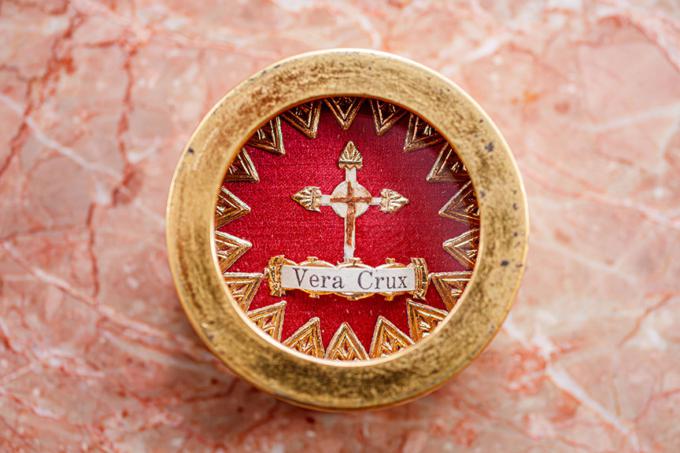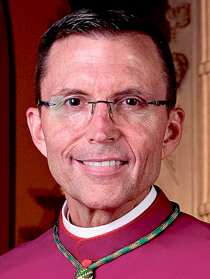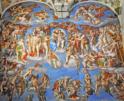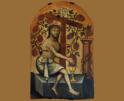
Faith
Sometimes I think it surprises Catholics that others see a crucifix and are repelled by the violent and unjust death it depicts.

Reed
The crucifix is so central to who we are as Catholics that we keep it often before our eyes; we hang it on our walls and wear it around our necks and even place it on our desks and dashboards, because the great mystery of the Lord's sacrifice both confounds Catholics and continually attracts us. This self-emptying -- Christ's passion, death and resurrection that we find there -- is at the core of who we are as his disciples.
Some years ago, I had a confrontation at a wedding rehearsal. The person was not terribly enamored of Catholics and after chastising me for something I'd said during the rehearsal concluded with, "And you Catholics, why do you always have to show that disgusting cross with the dead body on it. Isn't your religion about love, not death?"
I was so surprised I was speechless. I shrugged my shoulders, and I said: "Yes?"
Sometimes I think it surprises Catholics that others see a crucifix and are repelled by the violent and unjust death it depicts. We forget that they've not been made intimate (through daily devotions and the Mass) with the idea that the corpus at its center comes to us at the very intersection of all that is horizontal and vertical -- and thus all that was in the beginning, is now, and forever shall be.
The thought is prompted by G.K. Chesterton, who in his masterpiece, "Orthodoxy," wrote: "... the cross, though it has at its head a collision and a contradiction, can extend its four arms for ever without altering its shape. Because it has a paradox in its center it can grow without changing. The circle returns upon itself and is bound. The cross opens its arms to the four winds; it is a signpost for free travelers."
Yes. And perhaps that is why a Catholic looks at the crucifix and sees a mysterious and terrible beauty, and calls it such. An honest depiction of the central event of history, featuring the God-man who embraces all that is unjust, bears the harrowing stuff every one of us deals with -- fear, abandonment, betrayal, scolding and cynical mockery, physical pain unto death -- and then defeats it.
And none of it for his own sake, but wholly for ours.
"Lift high the cross
the love of Christ proclaim
'till all the world adore
his sacred name."
This familiar song forcefully expresses the Triumph -- the Exaltation -- of the Cross of Jesus Christ.
Each year on the 14th of September, we recall a historic event: in the year 326, the finding of the relics of the cross on which Jesus was crucified. St. Helena, the mother of Emperor Constantine, traveled to Jerusalem where she organized an excavation at the site of Calvary. The diggers uncovered three wooden crosses, but they could not tell which was the true cross. So, they brought to the site a terribly sick woman. The three crosses were touched to the woman, one after the other. Two of the crosses had no effect, but on contact with the third cross, the sick woman was instantly healed. St. Helena had her prize!
The cross immediately became an object of veneration, particularly on Good Friday. The name of the cathedral in Boston honors the Exaltation of the Cross and boasts of a significant relic of that treasure discovered by St. Helena, the actual wood upon which Jesus gave His life for our salvation. It is that same relic that is venerated each Good Friday.
At some point in life, we need to stop thinking so logically and move more deeply into the mystery of the cross. Interestingly enough, the only blessing given in silence is that given with a relic of the True Cross. Jesus emptied himself and became obedient to the point of death, "even death on a cross" (Phil 2:8). His loss of life, his seeming defeat upon this blood-drenched wood, was actually an exaltation and triumph for all of us who believe.
He is alive, risen from the dead. And in this life, in all of our struggles, Jesus -- the crucified and risen one -- is our only hope.
Ave Crux, spes unica! (Hail O Cross, our only hope!) May these words remain ever on our lips, for the cross is a mystery of life and death. Life has triumphed over death.
- Bishop Robert Reed is an auxiliary bishop of the Archdiocese of Boston, pastor of Sacred Heart/St. Patrick Church in Watertown and president of the CatholicTV network.
Recent articles in the Faith & Family section
-
The kingdom of ChristJaymie Stuart Wolfe
-
Pilgrims of hope -- Holy Year of 2025Father Robert M. O’Grady
-
Honor Mothers at Home and In the MissionsMaureen Crowley Heil
-
On the vineScott Hahn
-
What is the church's position on the treatment of animals?Jenna Marie Cooper


















